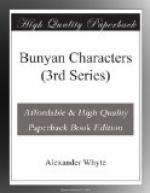insufferable. Why, prayers and tears that the
most and best of God’s people cannot attain to
are spurned and spat upon by Mr. Wet-eyes. The
man is beside himself with his tears. For, tears
that would console and assure us for a long season
after them, he will weep over them as we scarce weep
over our worst sins. His closet always turns
all his comeliness to corruption. He comes out
of his closet after all night in it with his psalm-book
wrung to pulp, and with all his righteousnesses torn
to filthy rags; till all men escape Mr. Wet-eyes’
society—all men except Mr. Desires-awake.
I will go out on your errand now, said Mr. Desires-awake,
if you will send Mr. Wet-eyes with me. And thus
the two twin sons of sorrow for sin and hunger after
holiness went out arm in arm to the great pavilion
together, Mr. Desires-awake with his rope upon his
head, and Mr. Wet-eyes with his hands wringing together.
Thus they went to the Prince’s pavilion.
I gave you a specimen of one of Mr. Wet-eyes’
prayers in the introduction to this discourse, and
you did not discover much the matter with it, did you?
You did not discover much filthiness in the bottom
of that prayer, did you? I am sure you did not.
Ah! but that is because you have not yet got Mr.
Wet-eyes’ eyes. When you get his eyes;
when you turn and employ upon yourselves and upon
your tears and upon your prayers his always-wet eyes,—then
you will begin to understand and love and take sides
with this inconsolable soul, and will choose his society
rather than that of any other man—as often,
at any rate, as you go out to the Prince’s pavilion
door.
5. ’Mr. Repentance was my father, but
good men sometimes have bad children, and the most
sincere do sometimes beget great hypocrites.
But, I pray Thee, take not offence at the unqualifiedness
of Thy servant.’ Take good note of that
uncommon expression, ‘unqualifiedness,’
in Mr. Wet-eyes’ confession, all of you who
are attending to what is being said. Lay ‘unqualifiedness’
to heart. Learn how to qualify yourselves before
you begin to pray. In his fine comment on the
137th Psalm, Matthew Henry discourses delightfully
on what he calls ‘deliberate tears.’
Look up that raciest of commentators, and see what
he there says about the deliberate tears of the captives
in Babylon. It was the lack of sufficient deliberation
in his tears that condemned and alarmed Mr. Wet-eyes
that day. He felt now that he had not deliberated
and qualified himself properly before coming to the
Prince’s pavilion. Do not take up your
time or your thoughts with mere curiosities, either
in your Bible or in any other good book, says A Kempis.
Read such things rather as may yield compunction
to your heart. And again, give thyself to compunction,
and thou shalt gain much devotion thereby. Mr.
Wet-eyes, good and true soul, was afraid that he had
not qualified himself enough by compunctious reading
and self-recollection. The sincere, he sobbed
out, do often beget hypocrites! ’Our hearts




